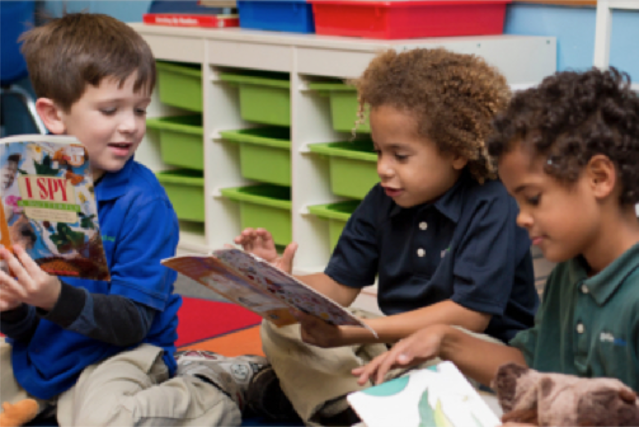Education
Nurturing the Gifts of EVERY Child
Presenting a model of a school that builds on children’s interests.
Posted June 30, 2016
Post by Michele Gregoire Gill, Associate Professor of Elementary Education, University of Central Florida. Michele is the founder and board chairperson of the Galileo School for Gifted Learning, Treasurer of APA’s Division 15, and co-editor of the International Handbook of Research on Teachers’ Beliefs.

At 21, I thought I had solved the problem of education; in fact, I dedicated my undergraduate thesis to the “transformation of the present educational system” in the U.S. Despite the hubris of my young self, I still believe that such change is necessary and even achievable.
As I learned from my work in several colleges of education throughout the past 15 years, teaching teachers is not enough. Many new teachers abandon what they learn in their teacher training programs when they enter a school whose culture and policies are opposed to what they learned as undergraduates. Further, under stress (and what new teacher teaching in these days of high accountability isn’t stressed?), new teachers often revert back to the way they were taught in school rather than the more creative, innovative methods they may have learned in their undergraduate program. From my research on conceptual change, I have come to see how difficult it is to change individuals when the organizational culture actively (or even implicitly) opposes such changes. To really make a difference in education, I realized that I would have to change the culture of an entire school. I initially resisted this calling—as a mom of two spirited young boys with a heavy teaching load, who was I to tackle such a task? Yet, after my 2009 “I have a dream”-type post on Facebook received such positive support, I knew I wasn’t alone in my desire for a different type of educational experience for youth, particularly those quirky, bright kids who were becoming disaffected by education, even as young as second grade.
A year later, in October 2010, our charter application for the Galileo School for Gifted Learning was approved by the local school district, and our doors opened in August 2011. Galileo School is a public charter school, located in a high poverty neighborhood, free to all students and open to all who are chosen via a random lottery. For the 2015-16 school year, 396 students were enrolled at the school. Of these students, 37% were non-white, 23% were identified gifted, and 13% were identified as having special needs.
Productive Partnerships
Given Dr. Perry’s presidential theme of Bridging Theory and Practice through Productive Partnerships, I want to touch on how partnerships have fueled Galileo School’s success. First, as a faculty in the University of Central Florida’s (UCF) College of Education and Human Performance, I sought my department chair’s permission to pursue this endeavor. My college has been highly supportive of my work to establish this school. I also recruited fellow faculty member, Dr. Debbie Hahs-Vaughn, to join our founding board. Her background in research and assessment greatly helped with writing our charter application. My background in educational theory, philosophy, and history provided the conceptual model for the school. We then sought out another faculty member, Dr. Gillian Erikson (an international expert in gifted education), to help with infusing a model of gifted learning into the curriculum and daily plan.
This vision would have remained a dream, if not for the contacts we made with local leaders, including a member of the county school board and a local city councilman; both provided invaluable feedback on the charter application process and helped facilitate meetings with relevant stakeholders, including the local school board and its administration team. What clinched the process was that we were able to establish that Galileo School was filling a niche in the school district which the current schools weren’t able at that time to address. Thus the school was seen as a benefit to the district, and a solid partnership with the local school district resulted. We also worked with the educational leadership faculty at UCF to connect us to a local principal, who helped us find teacher candidates and, eventually, a principal for the Galileo. Parents found the school through word of mouth and our Facebook page, and they brought their community connections with them, which greatly helped the school succeed, especially in our early years before the school had made a name for itself.
School Mission and Conceptual Framework
The overall mission of Galileo School is to nurture the unique gifts of every child. Because research is clear that students learn best when they are engaged in learning, I began with a focus on the heart of learning, grounding the core school principles in self-determination theory. Specifically, I wanted to ensure that the focus of all decision-making was rooted in promoting competence, relatedness, and autonomy not just for our students, but for faculty and staff as well. Teachers who feel disconnected from other teachers and staff, who don’t have opportunities to develop and strengthen their expertise, and who feel like they are puppets of some larger system over which they have no control are more likely to experience burnout and leave the profession. For students, self-determination theory promotes a more optimal, engaging learning environment where test scores are not the ultimate end of education; rather, growth as an individual and community member is valued.
Vygotsky’s theory also formed a large part of the conceptual framework of the school, particularly his idea that learning should advance a child’s development rather than follow it. This influenced the Goldilocks principle discussed below, as well the school’s commitment to play in learning. Informal yet frequent formative assessments are used to help diagnose what students can do independently and what they can do with assistance, helping identify their zone of proximal development. Galileo School’s curricular plan acknowledges the importance of recess and movement in learning, and students have at least two recess periods per day, as well as freedom to move about the classroom and school space.
Innovative Grouping
Other key motivation theories guided the foundation of the school—including research in interest and engagement, which led to flexible grouping arrangements for different learning situations. For core academic subjects (reading and math), students are placed in highly fluid ability groups based on diagnostic testing and teachers’ and parents’ input. These groups occur across and within grade levels without any ostracism since students are frequently moving or changing groups. You may see kindergartners in a second grade math class, or a fifth grade class with six different math groups. Once students master relevant competencies, they are moved to a different group. We work on establishing norms during the first month of every school year to help students understand that each student has unique needs that will be met in a variety of ways. What works for one student may not work for another.
There are two other types of grouping arrangements at this school: age-based groups and interest-based groups. Students are assigned to homerooms based on their age so that interdisciplinary instruction and field trips take place with one’s peers. However, in the afternoons, every two weeks, students rotate through a series of self-chosen mini-classes we call “Creative Productivity” workshops in which they pursue a subject in depth based on their interests, such as robotics, rock band, or roller coaster design. In these interest-based groups, they join with students from across the school, working with peers of differing ages and ability levels. Such flexible grouping arrangements create a strong community spirit at the school, with kids in different grades befriending each other, and teachers have the benefit of knowing (and coming to care about) more than just their own class of students.
Guiding Principles
These psychological theories form the school’s five core Guiding Principles, tenets which we use to guide all decision making at Galileo School:

- Nurture (aka the Love Principle): We focus on the individual child, nurturing his/her social and emotional needs.
- Challenge (aka the Goldilocks Principle): We meet students in their ZONE with work that is not too easy, nor too frustrating for them.
- Motivation (aka the Power Principle): We give students voices and choices in their learning. Students get to participate in classroom AND school-wide decision making on issues that affect them.
- Passionate Interests (aka the No Child Left Bored Principle): We provide frequent opportunities for authentic, interdisciplinary learning based on students’ interests.
- Service (aka the Empathy Principle): We encourage students to use their gifts and talents to solve problems to help make the world a better place.
Continuous Improvement and Partnerships, Continued
We use annual staff, parent, and student surveys to assess whether we are meeting our objectives, and the school consistently receives high ratings in these surveys from all community members. Our work is paying off. Galileo School was selected as the sole recipient of the American Psychological Association’s 2015 Golden Psi Award, which recognized the school for its sound application of evidence-based practices. To ensure Galileo School’s fidelity to its mission, vision, and conceptual framework, I remain as vision keeper and chairperson of our nonprofit board that oversees the management of the school while retaining my position at UCF as associate professor of elementary education. Yearly strategic planning sessions involving faculty, staff, board members, and parents help us remain on course, alerting us to upcoming concerns or places where adjustments are necessary to remain faithful to our mission.
We also look to embrace new research. Galileo School was one of the few schools chosen by the UCF’s College of Education and Human Performance to be part of its partner schools consortium. We have made deliberate efforts to provide opportunities for our teachers to become clinical supervisors for UCF teaching interns, even hosting a class on our campus. The regular availability of interns helps keep our teachers aligned with current methods in each subject area. Finally, we have our own Institutional Review Board at Galileo School that must review all proposed research projects at the school, with a policy of allowing research only if it provides some benefit to our students.
In short, research-based education—grounded in educational psychology research and theory, with supports in place to ensure fidelity to the school’s conceptual framework—works! Galileo School is one of the top schools in the central Florida region and has received national recognition. We cannot fix schooling in this country with piecemeal approaches or Band-Aid reforms. I am not writing to advocate for more charter schools—there are many that are failing to serve children’s needs, just like there are public schools failing our nation’s children. Instead, I am writing to advocate for a new paradigm for schooling in this country. We have an ethical and moral responsibility to ensure that EVERY child is given sufficient opportunity to discover and strengthen their talents and remediate deficits. Such an approach is within our reach, if only we re-examine the conceptual paradigms underlying our current models of schooling and choose student-centered approaches that work, in partnership with local school districts and local stakeholders who are themselves committed to high quality education for children.
This post is part of a special series curated by APA Division 15 President Nancy Perry. The series, centered around her presidential theme of "Bridging Theory and Practice Through Productive Partnerships," stems from her belief that educational psychology research has never been more relevant to practitioners' goals. Perry hopes the blog series will provoke critical and creative thinking about what needs to happen so that researcher and practitioner groups can work together collaboratively and productively. Those interested can learn more—and find links to the full series—here.
References
American Psychological Association, Coalition for Psychology in Schools and Education. (2015). Top 20 principles from psychology for preK–12 teaching and learning. Retrieved from http://www.apa.org/ed/schools/cpse/top-twenty-principles.pdf
Fernet, C., Guay, F., Senécal, C., & Austin, S. (2012). Predicting intraindividual changes in teacher burnout: The role of perceived school environment and motivational factors. Teaching and Teacher Education, 28(4), 514-525. doi:http://dx.doi.org/10.1016/j.tate.2011.11.013
Gill, M. G., & Boote, D. N. (2012). Classroom culture, mathematics culture, and the failures of reform: The need for a social view of culture. Teachers College Record, 114(12), 1-45. Retrieved from http://www.tcrecord.org/content.asp?contentid=16718
Gregoire, M. (2003). Is it a challenge or a threat? A dual-process model of teachers' cognition and appraisal processes during conceptual change. Educational Psychology Review, 15, 147-179.




